They are interesting, venturers in the good sense and known for their achievements not only in Greece but throughout the world.
 The alternate director Renos Haralambidis with his surreal film Four Black Suits won the audience applause. He is famous for his old autobiographic films Cheap Cigarettes, which shows a deserted Athens in August and No Budget Story. "I am obsessed with Charlie Chaplin’s syndrome. He too wrote, directed, played and even composed the music for his films." He says that for him every film is like going to amusement park and greatly excited willing to play, romp about and draw on the source of pleasure. But to say that he is successful in what he does, according Haralambidis success lies in paying the price for this, which is mostly about having the nerve to make your dream come true.
The alternate director Renos Haralambidis with his surreal film Four Black Suits won the audience applause. He is famous for his old autobiographic films Cheap Cigarettes, which shows a deserted Athens in August and No Budget Story. "I am obsessed with Charlie Chaplin’s syndrome. He too wrote, directed, played and even composed the music for his films." He says that for him every film is like going to amusement park and greatly excited willing to play, romp about and draw on the source of pleasure. But to say that he is successful in what he does, according Haralambidis success lies in paying the price for this, which is mostly about having the nerve to make your dream come true.
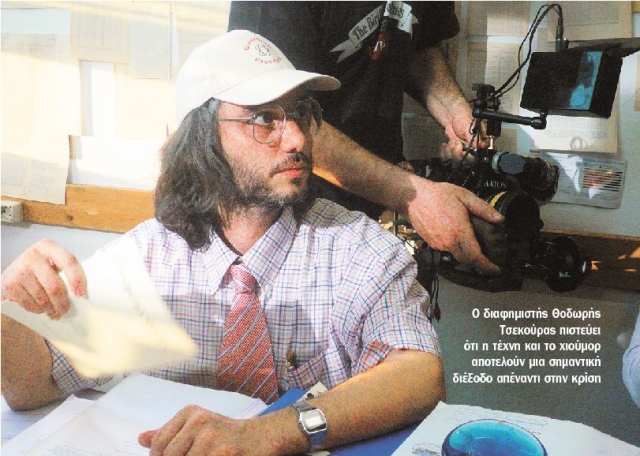 From creative in advertising, Teodoros Tsekouras became the most familiar face of TV commercials because of his cool remark "Is it by chance? I don’t think so." He invents the remark and without being an actor appeared in the ad campaign of 11888 telephone services, his phrase turns into flying word-of-mouth. Because of this phrase he was even invited to participate in a congress on the media in the Athens University Pandit. The character of the commercial is the scholar Pitagoras Cocteau who is obsessed with figures and in all combinations sees the number 11888 - "Is it by chance? I don’t think so!" he says. "Many people who watch the commercial think I really am a mathematician. They are so convinced. But reality is quite different. I am an ordinary person from advertising that is not stuck to figures but to my newborn son."
From creative in advertising, Teodoros Tsekouras became the most familiar face of TV commercials because of his cool remark "Is it by chance? I don’t think so." He invents the remark and without being an actor appeared in the ad campaign of 11888 telephone services, his phrase turns into flying word-of-mouth. Because of this phrase he was even invited to participate in a congress on the media in the Athens University Pandit. The character of the commercial is the scholar Pitagoras Cocteau who is obsessed with figures and in all combinations sees the number 11888 - "Is it by chance? I don’t think so!" he says. "Many people who watch the commercial think I really am a mathematician. They are so convinced. But reality is quite different. I am an ordinary person from advertising that is not stuck to figures but to my newborn son."
 The TV debut of the chef Dimitrios Skarmoutsos as a member of the jury in the Master Chef competition is not unnoticed. He is young, he made five tattoos only in the last year, he is dressed in loose trousers and stylish shirts or modern T-shirts. The coolest chef on the screen says that style to him means to be in harmony with yourself - what show out with your inner self. "It is not just about clothes - but to be organized as a person, to have some kind of structure and to wear smooth and symmetric clothing that fit with one another - but how you behave with people in general," he says.
The TV debut of the chef Dimitrios Skarmoutsos as a member of the jury in the Master Chef competition is not unnoticed. He is young, he made five tattoos only in the last year, he is dressed in loose trousers and stylish shirts or modern T-shirts. The coolest chef on the screen says that style to him means to be in harmony with yourself - what show out with your inner self. "It is not just about clothes - but to be organized as a person, to have some kind of structure and to wear smooth and symmetric clothing that fit with one another - but how you behave with people in general," he says.
 The most interesting TV hosts, or the guys from the Radio Arvila show, entertaining for years the Greeks by mocking on other TV stars, politicians or whoever come across their sights. Their humour is rarely tabooed and people actually like them because they make you feel in the company of four constantly joking cute guys. They themselves admit that they are together the whole day, they have been friends for years, but do not want to see each other for three months in the summer.
The most interesting TV hosts, or the guys from the Radio Arvila show, entertaining for years the Greeks by mocking on other TV stars, politicians or whoever come across their sights. Their humour is rarely tabooed and people actually like them because they make you feel in the company of four constantly joking cute guys. They themselves admit that they are together the whole day, they have been friends for years, but do not want to see each other for three months in the summer.
 The two friends who have been announced the greatest contributors to environment protection are Dimitris Rigopoulos and Tassos Halkiopoulos or the founders of the famous civil movement Atenistas. You can see the members of the movement, to which everyone can join, to plant flowers on an abandoned plot of land in the city, to organize music procession in the most abandoned neighbourhoods of Athens, or to collect second hand clothes to give them to the wanderers. "The crisis brings to the surface the need for human action. The truth is that they myth for the true capabilities of the state to do anything for the citizens and the city was busted. We have always left the responsibility to the state and we have neglected our own share of it," say the activists for a more pleasant city.
The two friends who have been announced the greatest contributors to environment protection are Dimitris Rigopoulos and Tassos Halkiopoulos or the founders of the famous civil movement Atenistas. You can see the members of the movement, to which everyone can join, to plant flowers on an abandoned plot of land in the city, to organize music procession in the most abandoned neighbourhoods of Athens, or to collect second hand clothes to give them to the wanderers. "The crisis brings to the surface the need for human action. The truth is that they myth for the true capabilities of the state to do anything for the citizens and the city was busted. We have always left the responsibility to the state and we have neglected our own share of it," say the activists for a more pleasant city.
 The most recognizable Greek worldwide is perhaps Adam Mposdoukos, who played the title role in Fatih Akin’s film Soul Kitchen which took the grand prize of the 66th Festival in Venice. Mposdoukos says that his mother is from Yanena and his father is from the district of Ilia in Peloponnese but they fled to Germany and he was born in Hamburg. For years he has been trying to escape the image of the Greek the producers in Germany were taking him to play in their films. But recognition comes with a film of his childhood friend Fatih Akin. "When we were 13 years old we were in the same class for one year - then we were separated. It was better, because I think we would not finish school otherwise..." says Adam Mposdoukos.
The most recognizable Greek worldwide is perhaps Adam Mposdoukos, who played the title role in Fatih Akin’s film Soul Kitchen which took the grand prize of the 66th Festival in Venice. Mposdoukos says that his mother is from Yanena and his father is from the district of Ilia in Peloponnese but they fled to Germany and he was born in Hamburg. For years he has been trying to escape the image of the Greek the producers in Germany were taking him to play in their films. But recognition comes with a film of his childhood friend Fatih Akin. "When we were 13 years old we were in the same class for one year - then we were separated. It was better, because I think we would not finish school otherwise..." says Adam Mposdoukos.
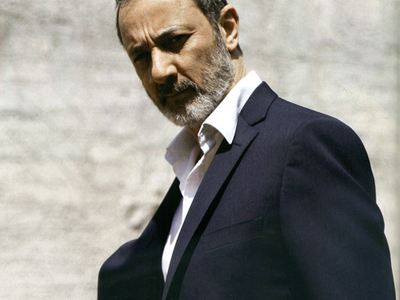 The star of the actor Stelios Maynas shone this year with the Greek series The Island made after Victoria Hislop's novel. The way he created his character and played his role made it the role of his life. "When you're young you have the sense for many things but you can not play them. The oung has the feeling but the old has the experience. When you're young it is enough to take part, but things change when you grow up. You have to take a stand, to choose which side to take, to gain identity, not to find fans but to find companions."
The star of the actor Stelios Maynas shone this year with the Greek series The Island made after Victoria Hislop's novel. The way he created his character and played his role made it the role of his life. "When you're young you have the sense for many things but you can not play them. The oung has the feeling but the old has the experience. When you're young it is enough to take part, but things change when you grow up. You have to take a stand, to choose which side to take, to gain identity, not to find fans but to find companions."
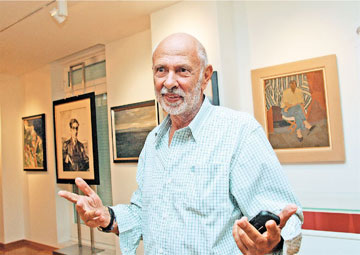 The best manager we could say is Angelos Delivorias or the director of the Benaki Museum. This year the museum celebrated its 80th anniversary, and Mr. Delivorias is its manager since 1973. Currently he is preparing its newest branch: the Pinacoteca of Nikolaos Hazikiriakos-Gikas. "Benaki Museum threw me in the deep waters of the identities, of what it means to be Greek. So, when I'm asked what I do, I say: "I am the director of the Benaki Museum." I personally owe my acquaintance with the country to that occupation. I had associates in all museums - in the central one, in that of Islamic art and the new one, but the Museum is mine. Selection, aesthetics, logic, structure, continuity of an exhibition with the other ...the spirit is mine."
The best manager we could say is Angelos Delivorias or the director of the Benaki Museum. This year the museum celebrated its 80th anniversary, and Mr. Delivorias is its manager since 1973. Currently he is preparing its newest branch: the Pinacoteca of Nikolaos Hazikiriakos-Gikas. "Benaki Museum threw me in the deep waters of the identities, of what it means to be Greek. So, when I'm asked what I do, I say: "I am the director of the Benaki Museum." I personally owe my acquaintance with the country to that occupation. I had associates in all museums - in the central one, in that of Islamic art and the new one, but the Museum is mine. Selection, aesthetics, logic, structure, continuity of an exhibition with the other ...the spirit is mine."
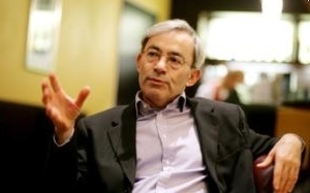 Christoforos Pissaridis won the Nobel Prize for Economics along with his colleagues from the USA Peter Diamond and Dale Morte and became the first Greek Nobel winner in science. He returned permanently in Cyprus, but the joke within his complaint is that he can no longer think aloud, because even a guess of his becomes a title! "Unemployment is an economic problem, so economic solutions are needed. But the consequences on people are social and political solutions are needed there... Greece will emerge from the crisis wiser, more modern, more ready to cope with the future. Previous generations pulled it off course, but today’s generation, which currently pays the price, will be able to live much better."
Christoforos Pissaridis won the Nobel Prize for Economics along with his colleagues from the USA Peter Diamond and Dale Morte and became the first Greek Nobel winner in science. He returned permanently in Cyprus, but the joke within his complaint is that he can no longer think aloud, because even a guess of his becomes a title! "Unemployment is an economic problem, so economic solutions are needed. But the consequences on people are social and political solutions are needed there... Greece will emerge from the crisis wiser, more modern, more ready to cope with the future. Previous generations pulled it off course, but today’s generation, which currently pays the price, will be able to live much better."
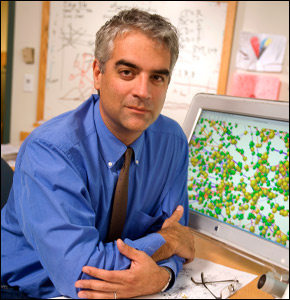 The Harvard University professor Nikolaos Hristakis is notorious with his theory of networks and is among the 100 individuals with the greatest impact on the planet, according to Time magazine. "We should care what happens to the person next to us ... Our study is a slap for the free will: it shows that things we think are at our discretion or taste are influenced by the views of our friends or of those who are friends of friends of our friends. But at the same time it brings the free will, because if you do something good, stop smoking for example, or make something good, it affects the people around you and shows you have strong will and it grows. According to the scientist, Greece moves in the right direction, because politicians are determined to cope with the situation and take the country out of the crisis.
The Harvard University professor Nikolaos Hristakis is notorious with his theory of networks and is among the 100 individuals with the greatest impact on the planet, according to Time magazine. "We should care what happens to the person next to us ... Our study is a slap for the free will: it shows that things we think are at our discretion or taste are influenced by the views of our friends or of those who are friends of friends of our friends. But at the same time it brings the free will, because if you do something good, stop smoking for example, or make something good, it affects the people around you and shows you have strong will and it grows. According to the scientist, Greece moves in the right direction, because politicians are determined to cope with the situation and take the country out of the crisis.
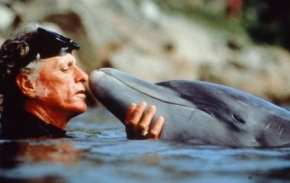 Louis Psihogios is the man who made the story for the dolphins killed by Japanese fishermen, well known throughout the world under the title The Cove. He won Oscar with his first film which has helped the film to be released in cinemas in Japan. There was strong response from a group that did not want the truth to be heard, says Psihogios. He becomes part of the team of National Geographic at the age of 23 years and says this is the greatest thing that happened to him. "I wanted nothing more in life ... The search for perfection for me is inhesion, obsession. Even when I worked as a photographer, I wanted to know everything about the person or topic which I was going to shoot, I felt the need to study everything in detail first."
Louis Psihogios is the man who made the story for the dolphins killed by Japanese fishermen, well known throughout the world under the title The Cove. He won Oscar with his first film which has helped the film to be released in cinemas in Japan. There was strong response from a group that did not want the truth to be heard, says Psihogios. He becomes part of the team of National Geographic at the age of 23 years and says this is the greatest thing that happened to him. "I wanted nothing more in life ... The search for perfection for me is inhesion, obsession. Even when I worked as a photographer, I wanted to know everything about the person or topic which I was going to shoot, I felt the need to study everything in detail first."
Based on Status magazine publications. Images Vima newspaper, Angelioforos, Archeologia, in2life